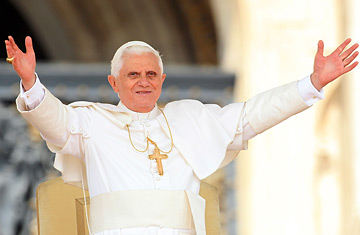
Pope Benedict XVI leads his weekly general audience in St. Peter's Square at the Vatican.
Exactly one year ago, the Vatican press corps set out from Rome on a papal trip that wasn't expected to produce major headlines. Yes, Pope Benedict XVI was visiting his native Bavaria on the Sept. 9-14 voyage, and there would be photo opportunities from his small riverside hometown and the university where he'd once taught theology. We now know, of course, that his Sept. 12, 2006, visit to his old teaching haunt, the University of Regensberg, would become the stage for the most significant moment of Benedict's papacy thus far. The provocative lecture about faith and reason, and the violence in Islam, set off riots in some corners of the Muslim world, and sparked renewed debate about the theological and philosophical roots of the so-called "clash of civilizations" percolating across the globe. Flinging the mild-mannered Benedict into the fire of breaking-news notoriety — with both his keen intelligence and striking lack of political acumen on fine display — the controversial lecture is the singular watershed of his papacy. Indeed, Vatican watchers now commonly divide Benedict's reign into "before and after" Regensberg.
Now, following momentous visits to Turkey and Brazil, the 80-year-old Pope begins a three-day September swing that looks similar — on paper — to his low-key itinerary back a year ago. He hopped back just across the Alps on Friday, this time for three days in Austria, which sits just on the border of his native Bavaria. He will again deliver a series of speeches in German, including an address Friday evening to a gathering of international diplomats in Vienna that touched on some hot-button issues facing world leaders. Speaking with a slightly hoarse voice, the Pope delivered something of a wake-up call to Europeans who "need to make their political importance felt" in troubled regions like Darfur and the Middle East, and in the fight against poverty. "Europe has a unique responsibility in the world," Benedict said. "First of all, it must not give up on itself. The continent which, demographically is rapidly aging, must not become old in spirit ... [and] will grow more sure of itself if it accepts a responsibility in the world corresponding to its singular intellectual tradition, its extraordinary resources and its great economic power." Still, while forcefully argued, these were not the kind of electrifying words he delivered last year in Regensberg, and Vatican officials privately say they'd prefer a voyage that didn't necessarily produce so many headlines.
Nevertheless, as with every trip beyond Italian borders, the three-day trip to Vienna and the Marian shrine of Mariazell, could indeed include surprises. When he's on the road, Benedict often explores delicate themes with the full force of both his intellect and his sure-fire faith, which has gotten him into hot water not only in Regensberg. On his last trip to Brazil, the Pope was making big news before even landing by telling reporters on the Rome-to-Sao Paulo flight that pro-choice politicians were automatically excommunicated. Later, he would speak about the Church's role in colonizing Latin America, without mentioning the history of forced conversions and other violence by Catholics against the indigenous population.
On Friday, Benedict returned to one of his favorite themes: the growing secularization of Europe. This German-speaking country with deep Catholic roots is a case in point. One poll ahead of Benedict's trip tallied 82% of Austrians who said the visit was of little importance to them. Imploring Europeans to remember the continent's "Christian roots" and to take up the Church's battle against abortion and assisted suicide, the Pope warned against a "degeneration of tolerance into an indifference with no reference to permanent values."
The Pope's press secretary, Father Federico Lombardi, emphasized that this trip is meant to be more a papal pilgrimage than a pastoral visit, with the stated purpose to celebrate the 850th anniversary on Saturday of the shrine dedicated to the Virgin Mary. "My voyage is not political," the pontiff told reporters just before takeoff. "I want to join in with other faithful in this act of unity that such a journey brings." Nevertheless, Austrian Catholics will be looking to their pontiff for words of encouragement as the nation's Church continues to recover from a sex abuse scandal in the 1990s in which the then Archbishop of Vienna Hans Wilhelm Groer was forced to resigned under allegations that he himself had been a perpetrator. Indeed, some will consider the trip a success — even if a quiet one — if Benedict can simply heal old wounds rather than open new ones.
